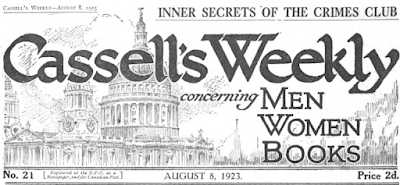"Inner Secrets of the Crimes Club."
By Ernest (Brown) Bowen-Rowlands (1866-1951).
First appearance: Cassell's Weekly, August 8, 1923.
Article (1 page).
Online at Hathi Trust (HERE).
(Note: Text somewhat distorted but legible.)
"Do you mean that Smith hypnotized his wives into committing suicide?"
Crime, we must never forget, is a human endeavor, and, as Hamlet observes, is therefore subject to "the thousand natural shocks that flesh is heir to"—the countless vagaries stemming from the human condition that can lead people as directly to criminality as to virtuous conduct. A book that came out almost a hundred years ago shows how capricious and human crime can be; it's a book which we have been unable to find anywhere and about which we know only what's said concerning it in the article:
Comment: It's not certain that this Crimes Club was the inspiration for Isaac Asimov's Black Widowers (HERE) through another group known as the Trap Door Spiders (HERE) beyond the obvious parallels given in the article, so we'll let you decide.
Resources:
- Is it simply a coincidence that at around this time William Le Queux, who is mentioned in the article, produced a story collection entitled The Crimes Club? The book can be found at Roy Glashan's Library (HERE), Fadedpage (HERE), and Archive.org (HERE):
"The Crimes Club was a secret organization to which no outsider was ever admitted under any pretext, while its proceedings were never mentioned in the newspapers. Besides studying crime, its unique purpose was to assist the police of France, or of any other country, to unravel the mysteries that baffled them. In certain bewildering cases the club had met with marked success, but . . . ."
~~~~~~~~~~~~~~~~~~~~~~~~~~~~~~~~~~~~~~~~~~~~~~~~~~~~~~~~~~~~~~~~~~~~~~~~



No comments:
Post a Comment